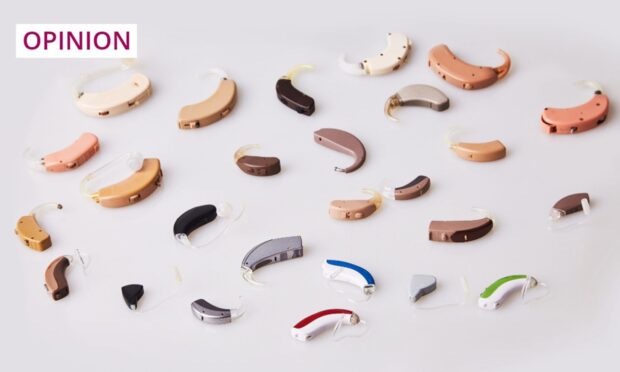Listen up – hearing aids are cool.
I would say that, of course, seeing as I now have a natty pair behind my lugs. Finally.
For me, the idea of a hearing aid was inextricably linked to the one my granddad had – a big beige box with a wire that went up to his ear, just like transistor radios had back in the same era.
This cemented in my head the belief that hearing aids were for old people and were cumbersome, ugly things. No way was I needing one of those in my tender years.
Except, I did. And I had known that for a good long while. Not that you had to be a genius to work out I was suffering from hearing loss.
The telly was up at IMAX level sound. Glasses were vibrating in the kitchen. Every other sentence Mrs B said to me was met with: “Can you say that again, please?”, “Sorry?” or the straightforward: “Eh?” Frustrating for us both, let me tell you.
And, in conversations with mates in pubs, I was quite simply lost. I had started watching people’s mouths as they talked to get a better idea of what they were saying. Eventually, it got to the point where I had no choice but to surrender to the inevitable.
I was missing out on much of the conversation
There was an underlying factor in my decision, too: my fear of Alzheimer’s, the disease that robbed me of my father – and an aunt, uncle, and cousin. When I read that hearing loss could be a contributing factor in the onset of that vile condition, I was spurred into action.
And, even as I was going through the fitting process for my hearing aids, I was given another incentive. A new study from America has shown hearing aids help people with hearing loss live longer, by as much as 25%, by boosting physical, social, emotional and mental well-being.
"I would also advise anyone starting to experience hearing loss to disclose it at work."
With Sandra’s hearing having deteriorated since 2003, she has faced a number of challenges in the workplace. Read more about her strategies to tackle them: https://t.co/TBIUdJ9Dln pic.twitter.com/isfOPpSgHf
— RNID (@RNID) January 6, 2024
I can see why. Pre-hearing aids, I was struggling in social settings. In the workplace, I was missing out on much of the conversation. At home, the inability to catch things was a bother. I might not have explicitly realised it, but I was probably diminishing from the world in increments.
Not anymore. I have aids that are discreetly behind my lugs (despite no hair to disguise them) and I can hear properly again. I’m connected once more. I like it. In fact, I wish I had done it years ago.
Stigma stops people from getting help with hearing
I’m not alone in that hesitancy, though. Hearing loss charity RNID reckons seven million people in the UK could benefit from hearing aids, but only two million use them. Stigma plays a big role in that, apparently.
It did for me, to begin with. It never should have.
Please, if you are struggling to hear, don’t hesitate to get checked out by an audiologist
I don’t think twice about wearing glasses and contact lenses to correct my vision. What’s the difference between getting help to see and getting help to hear?
So, please, if you are struggling to hear, don’t hesitate to get checked out by an audiologist. Trust me, you get back so much you didn’t realise you had lost – and you might even get more years to enjoy it.
Scott Begbie is a journalist and editor, as well as PR and comms manager for Aberdeen Inspired

Conversation